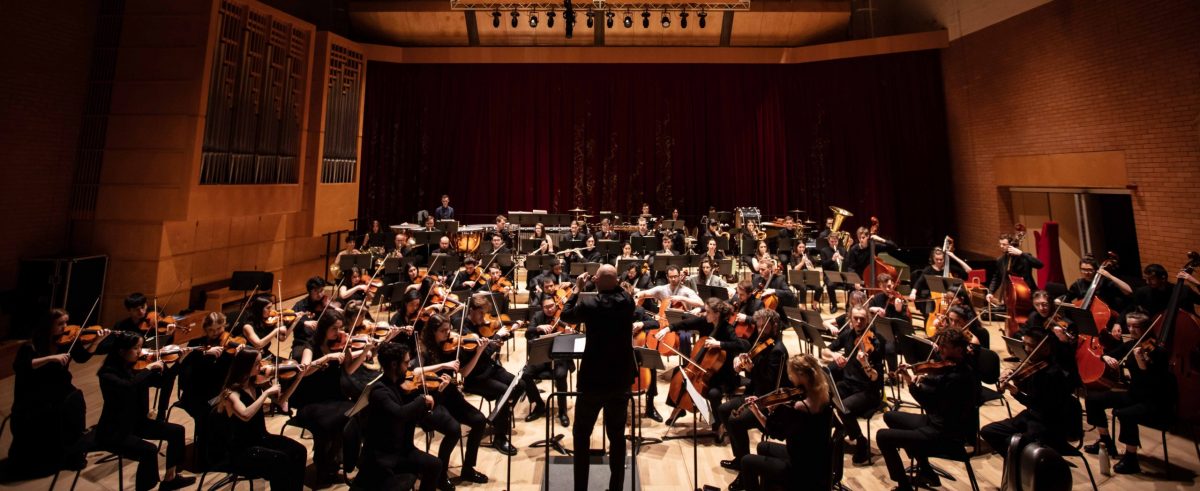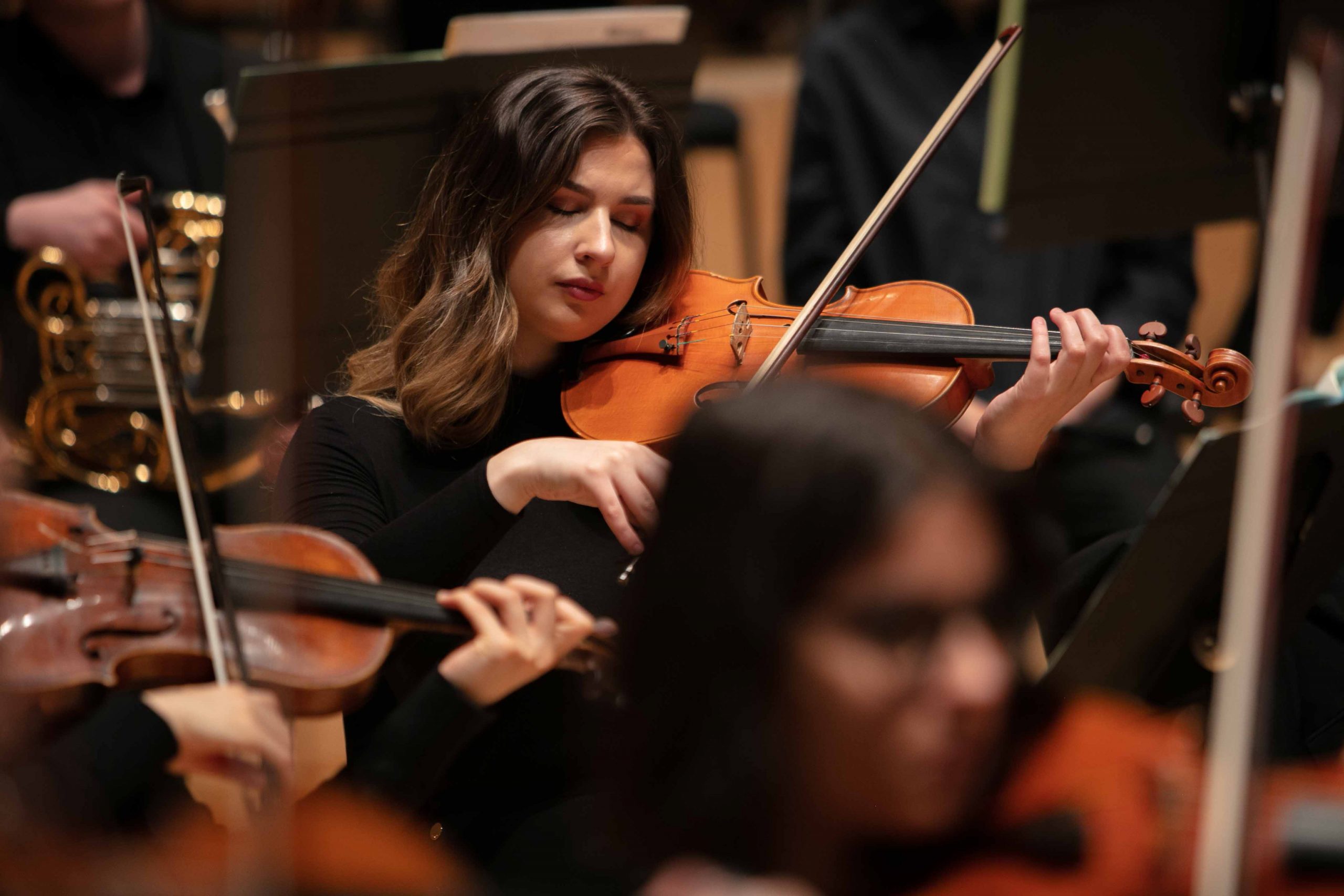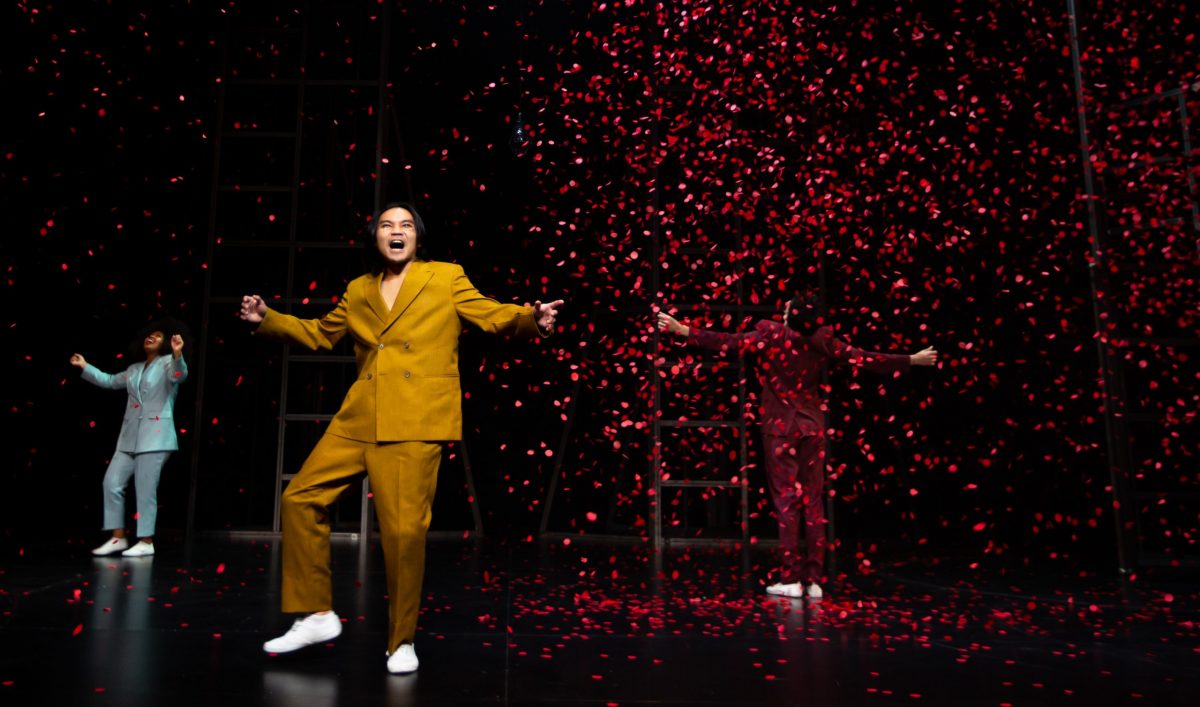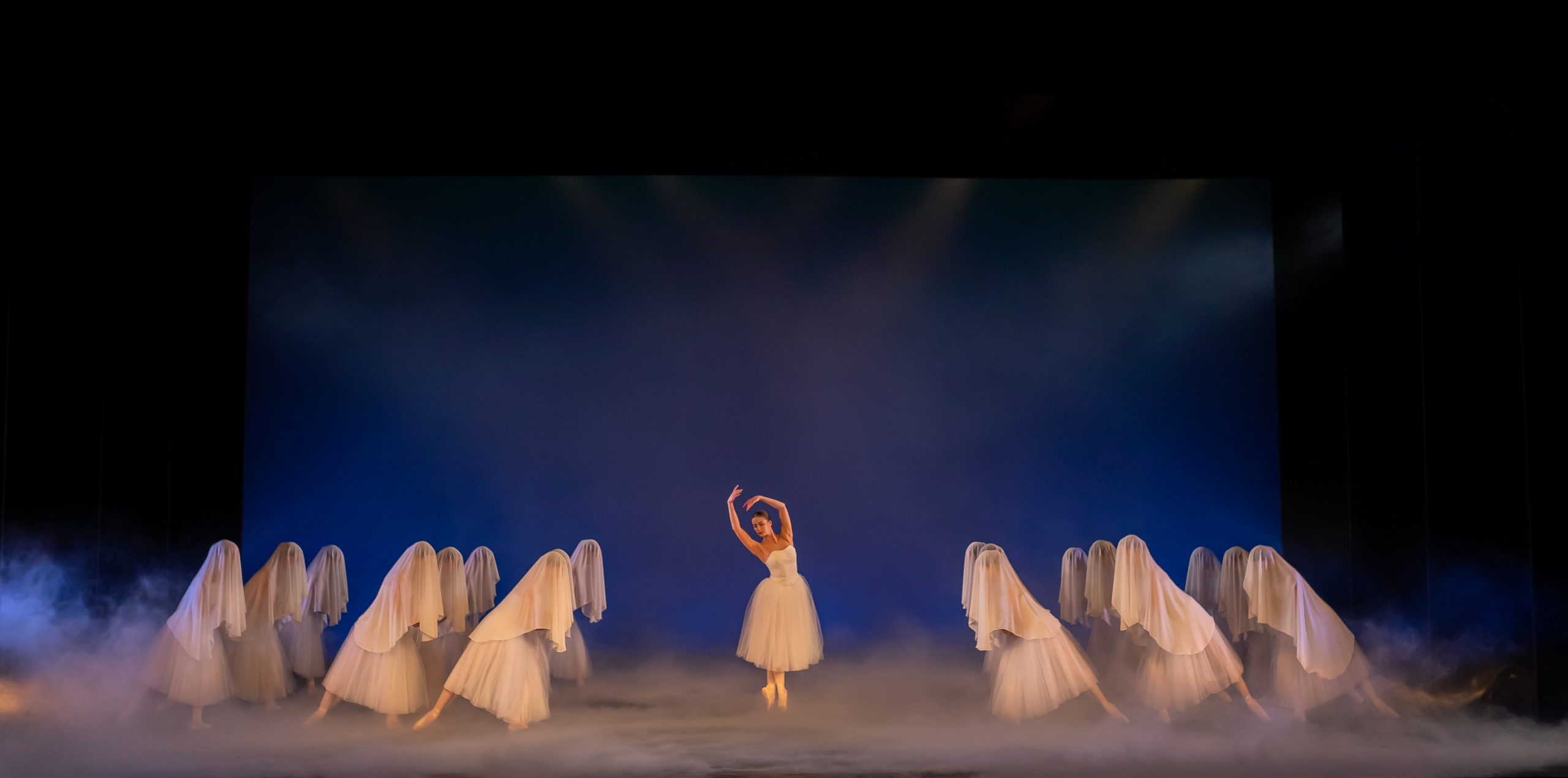Vantage Music | November 2020 | United Kingdom
Vantage is delighted to have the opportunity to interview with Professor Jeffrey Sharkey, Principal of the Royal Conservatoire of Scotland (RCS), who has been leading Scotland’s national conservatoire of music, drama, dance, production, film and education since September 2014.
RCS Symphony Orchestra performs in the Stevenson Hall. Image © Robert McFadzean-RCS
What have been your focuses since becoming principal in 2014?
Developing our curriculum to enhance collaboration and disciplinary excellence in our performing arts and making this a unique aspect of our work at the RCS. I wanted to share our exciting possibilities of innovative art making, producing, boundary blurring within this beautiful country with the wider world and grow our reputation well beyond the UK. At the same time, I want to ensure children and young people in Scotland have access to excellent arts training and the ability to progress in all areas – so a combination of thinking locally and globally has been one of my guiding principles.
The COVID–19 pandemic has also concentrated the mind on developing digital work when we cannot be face to face, and, more importantly, showing the world how our arts forms are the very thing that keep us together, moving forward and ultimately healing our societies.
You served as director of the Johns Hopkins University Peabody Institute from 2006 to 2014 and started a number of successful programmes across various academic departments. Would developing new programmes be part of your objectives?
One of the things I was proudest to help start was our “Tuned-In” programme at Peabody, aimed at Baltimore’s inner-city children, making it free for them to come and study in the Preparatory Division. Some of those students have gone on to senior conservatoires and into all parts of the music profession. Coming to the RCS, we were very keen to widen access and we started our “Transitions” programme, providing free access and mentoring in all of our pre-HE programmes and into our senior conservatoire as well. We have also started an innovative degree programme in performance for British Sign Language users and continue to create groundbreaking work within each major and between each one too.
Was the experience across different academic divisions at Johns Hopkins useful to the focus on music?
It was fascinating to have such a strong focus on medicine, public health, arts and sciences, and this contributed to many shared degree programmes and continues to inspire collaborations between the different divisions at Hopkins.
Is cross-disciplinary study encouraged at the RCS? If so, is it effective?
I would say this is a unique selling point of the RCS. We have music – classical, traditional, jazz, opera – working alongside drama, ballet, musical theatre, film, production and contemporary performance practice. We have courses and modules that encourage inter-disciplinary collaboration and believe this helps students not only learn divergently from one another’s art forms but also discover new art in the spaces between each discipline. This helps make our students adaptable, employable and always keen to explore new ideas.
How does the RCS differ from other conservatoires in the UK and across the world?
We are the national conservatoire for Scotland but we also have an international focus. The national conservatoire means we have a key stake in access to arts for all of Scotland’s young people and partnerships with every major Scottish arts organisation – from the national orchestras, opera and ballet companies to theatres and the BBC. The international means we want to share the unique Scottish flavour of sharing and openness (and beautiful countryside) with students from all around the world. Our coverage of all the performing arts is unique in UK terms and has parallels with sister institutions like the Hong Kong Academy for Performing Arts.
I believe the RCS is very forward-looking – asking itself where the arts are going (especially with the influence/challenges of the pandemic) and ensuring we maintain our relevance to the arts and to our students. We have wonderful partnerships in Asia (we are associate members of the South East Asia Schools of Music), with the HKAPA and with Xinghai Conservatory in Guangzhou, as well as within Europe and in the USA.
Any future projects?
We are looking at how best to respond to the pandemic, investing in digital production and creating new work across all of our art forms in socially distanced spaces. While restrictions have been in place, we have been making the most of blended learning – keeping classes online and giving face-to-face time to ensemble learning of all kinds.
We are also looking at partnership opportunities with local education authorities to ensure young people throughout Scotland can have the opportunity to study music, dance or drama regardless of their economic background and ability to pay.
What do students do after they graduate?
Our students go onto many things. We have soloists like the mezzo-soprano Karen Cargill, pianist Daniel Petrica Ciobanu, actors like David Tennant and James McAvoy and many graduates in orchestras, opera companies, ballet companies, theatres, television and movies (as actors or as production technicians) and in countless entrepreneurial small companies and ensembles making real differences in their communities. We have one of the highest employment rates in higher education in the UK, due in part to our breadth of training and the creativity of our graduates.
How are students and teachers and the institution adjusting to COVID–19?
I was amazed at how quickly we had to move online and was grateful to our students and staff for their creative response in March 2020. We had to teach music lessons, acting lessons, dance lessons – all online, across multiple time zones and with variable internet quality. It was lonely at times and we missed the energy of artists being in the same room together. But we also learned some things. Some shyer students were more willing to talk in an online performance class than in person, and our music students often had to pre-record and upload a video as the broadband was too slow for live playing – but they prepared more deeply than in a typical lesson. Our production students had to turn to old-fashioned but greener techniques of the past like papier mâché and our actors had to act with one another across many miles – guessing the reaction of their partner and giving the energy to each part on their phones.
We learned that digital format can help expand our reach – our RCS at Home digital platform reached many thousands of people across more than 90 countries, far more than our concert hall can hold, our digital open days got thousands of young people involved and our digital masterclasses had so many amazing artists who might not have had time to fly to Glasgow but could get on a Zoom call.
It also made us realise how precious the arts are – normally you survive a natural disaster or a war by coming together and COVID forces people apart to battle it successfully. We will need our arts to bring our society back and share our stories together.
If you were to give a music student one piece of advice, what would it be?
You have your own path and journey – what works for someone else might not be right for you. But the basic elements are to practise hard, with full attention to all the musical details – never on automatic pilot. Play chamber music, new music, collaborate with other arts – to get outside of your own head and be inspired. Always remember you are a student for life. There is always a new way to play an old piece, and a new piece to discover – this keeps us young! (I know that is more than one thing…)
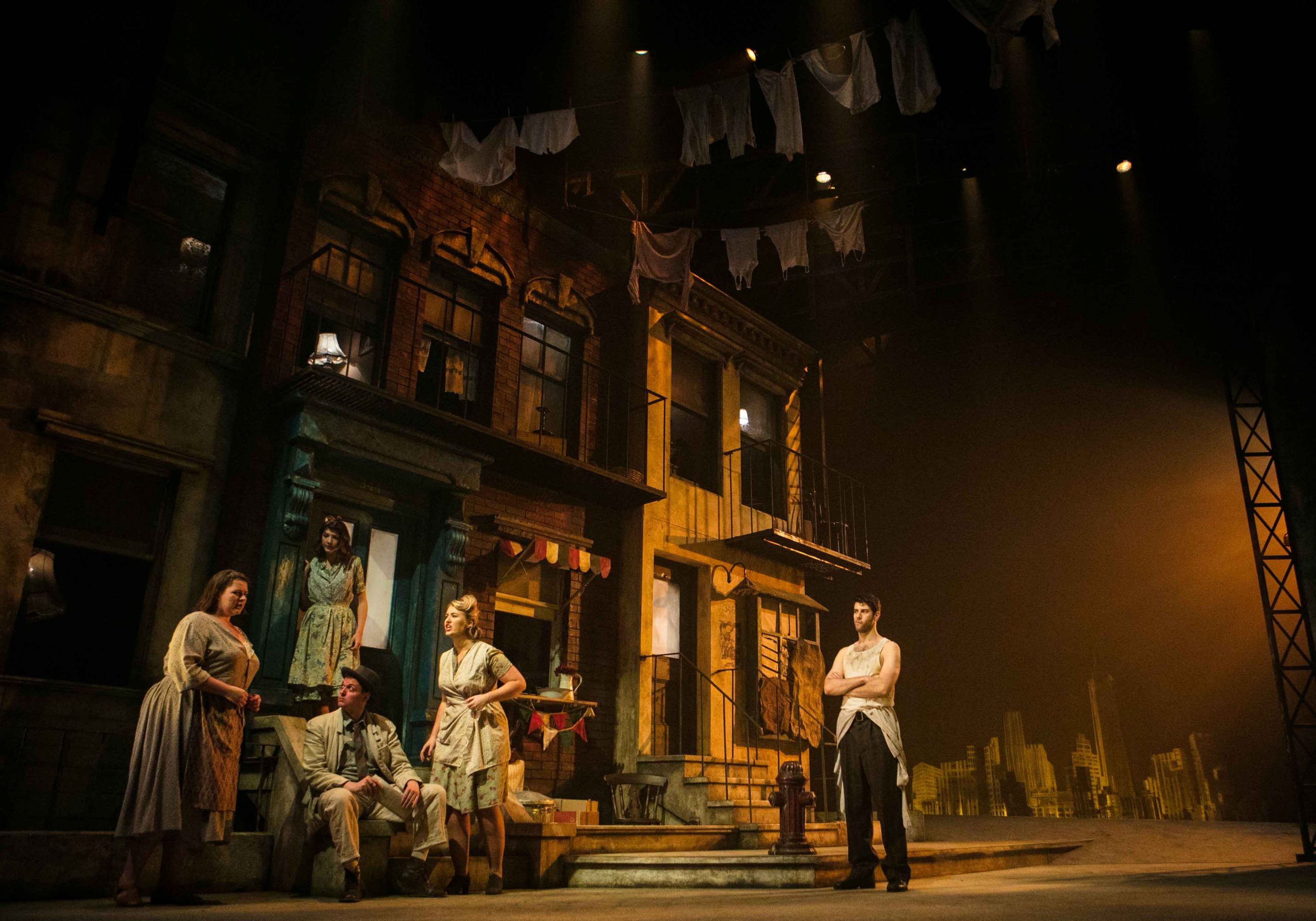
Street Scene, the Broadway opera, was staged at RCS, in the New Athenaeum Theatre, in 2018. Image © Robert McFadzean-RCS
How did you get started?
We had a piano in our living room – I used to hide under it and knock on the wood, try the keys and make all sorts of sounds. I enjoyed putting intervals on top of one another – and my love of harmony is still strong to this day. I played by ear for a while until my piano teacher realised I wasn’t reading the music and (rightly) insisted I learn how. My first recital must have been relaxing as I came onto the small stage, saw the comfortable piano bench, and lay down to go to sleep!
“I gradually have become a worse pianist but better musician”: from an interview in the Herald, 2014 – what did you mean?
I said these words pre-COVID. During lockdown, I was practising more piano than I had done since I had been at conservatory myself! What I meant was my work as principal (director or dean) does keep me away from regular practising – but it keeps me listening all the time to my students and colleagues. I learn from them all the time and now I also learn from how our dancers move across the stage or our actors immediately inhabit characters as well as from our musicians.
You concertised as a pianist – how did you do it with your other work, family and teaching?
When I started out, I tried to get work to support my playing and composing. I had a piano trio (the Pirasti Trio) for 13 years and we toured many places, recorded some CDs and collaborated with many wonderful musicians. I’d have to drive back in the dead of night and get ready to teach the next morning – so it was burning the candle at both ends. Then, when we had children, we would drop our daughter off with the in-laws at a motorway service station on the way to the concert as well. It was a lot of juggling – but I loved the balance of learning from performing and putting that into teaching – a lovely circle of work. My “day” job got busier when I became director of music at the Purcell School and busier still when I moved into higher education as dean at the Cleveland Institute of Music.
The Bacchae was the first staged dramatic production at the Royal Conservatoire since March 2020. The final year BA actors brought one of the world’s oldest surviving plays to life on the institution’s New Athenaeum stage, in a glorious production of David Greig’s version of Euripides’ The Bacchae. This performance was streamed in November. Image © Robert McFadzean-RCS
How did you meet Aaron Copland and then have lessons with him?
I was incredibly lucky that my hometown university (the University of Delaware) hosted a concert of Copland with the great man himself conducting. My dad was an administrator there and we were able to host him for dinner. It turned out he lived a few blocks from my grandparents in New York and he offered to let me have some lessons when I went up there to visit. So I tried to visit often…
He was one of the nicest people I met – no outsized ego at all, and he had great ears. He wanted to ensure that my music developed in a logical fashion – squeezing as much out of every idea rather than resorting to new ones at the first possible moment.
He wrote me a lovely recommendation to the Manhattan School of Music, which was one of the things that helped convince them to let me be their first double major that they allowed (in piano and composition).
Do you still compose now?
Sadly I do not have the time. I worry I have forgotten how – but maybe I will return to it at some point.
You studied with a lot of famous pianists such as John Browning, Constance Keene, Boris Berman and Peter Frankl. Would you like to share some memorable moments while studying with them?
Constance Keene was amazingly tiny and yet had a huge sound with a palette of colour that was so inspiring. John Browning was such an honest pianist – like Kapell – no “cheating” with the pedal allowed and talked about finger legato as well as telling amazing stories about the last-minute composition of the Barber Piano Concerto – written for him for the opening of the Lincoln Center.
Boris is a wonderful and thoughtful pianist who encouraged each student to develop their own voice and Peter was our chamber music coach – coming up with a wonderful way to play as an equal partner and yet not obliterate the strings.
What made you settle down in the UK in 1989? How did the move shape your development as a musician? Has your philosophy in education evolved?
I met my cello-playing wife as a grad student at Yale. She is British and had a scholarship that required her to return to the UK. We were engaged by the time we finished our master’s degrees, so I applied and was able to do my final MPhil degree at Cambridge University. We decided to start our life in the UK, formed a trio and I got a job (eventually – after 150 letters of application), first teaching piano in London and then as an academic music teacher at Wells Cathedral School. That developed into my being head of department and I was allowed to start the first composition department at Wells in its 800-year history. I learned so much from both my US and UK training. There is a different way of “breathing” the phrase in Europe – tempi are a bit slower, there is an emphasis on communication and colour foremost – that influenced my playing and thinking greatly.
My education philosophy has evolved. I still enjoy some teaching here at the RCS and working at some lovely summer music festivals. I have learned to be more of a guide than to tell students what to do – sometimes the best thing is to get out of the students’ way, guide their learning, and teach them to listen carefully to themselves to ensure the actual sound matches their intention.
The dance image is a scene from Giselle from the annual BA Modern Ballet graduation performance (2019). Image © Andy Ross-RCS
What made you go back to the US after 13 years in the UK? How did the UK experience contribute to being dean at the CIM and director at Peabody?
I loved my work at specialist music schools and became director of music at Purcell when I was in my early thirties. Most of my colleagues as directors were older, many holding the job until they retired. I wanted to move into higher education, applied for some jobs at the RAM, Goldsmiths and other universities, but never was able to get the job. I think I had been labelled an expert in the younger age, but it wasn’t felt it could translate into higher ed. Fortunately, the search panel in Cleveland believed me when I proposed that the skills were indeed transferable and moving to the US allowed me to get some amazing higher ed experience. I definitely leaned on my UK experience in working with wonderful faculty and students and translated that into US curricular work. In some ways I sought to add European ideas to the US curriculum and mostly that seemed to be welcome.
You were a board member at Singapore’s Yong Siew Toh Conservatory, an institution founded in partnership with Peabody. What was that like?
It was a joy to be involved in the growth of the YST. I loved the energy and passion of colleagues there and there is such a positive feeling in Singapore and other countries throughout Asia about the role of music in society. The wonderful thing about music is how it brings people from all countries and backgrounds together – something the world could use more of right now!


